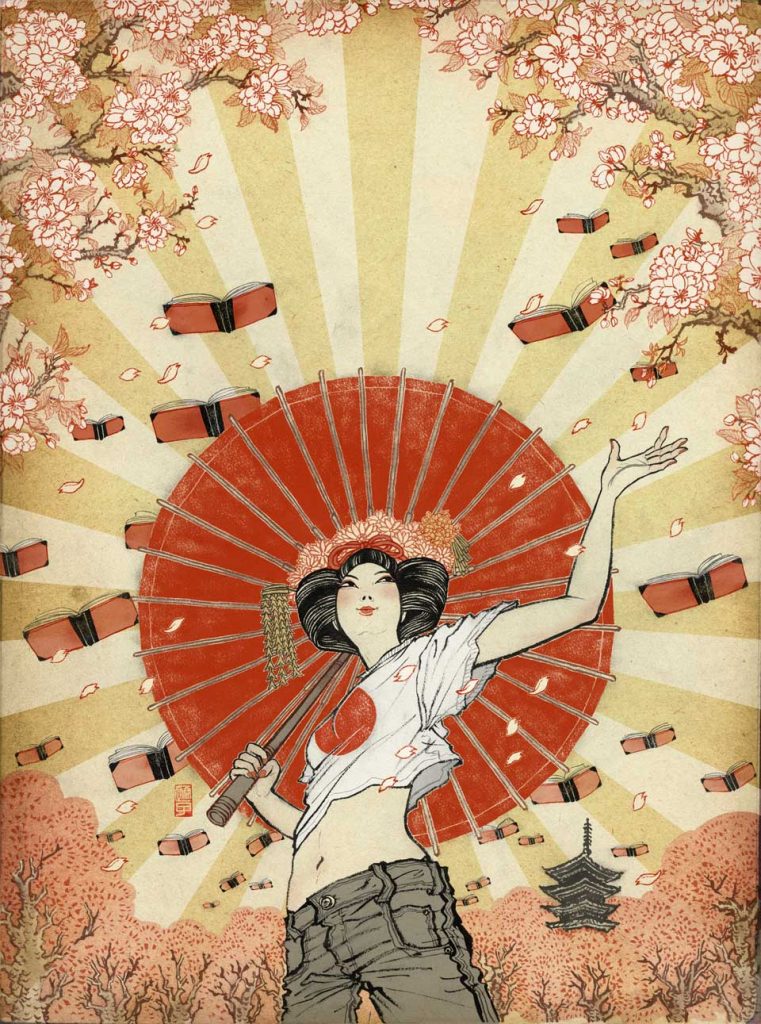
© Yuko Shimizu
Yuko Shimizu, a multi-award winning, New York based Illustrator and Globetrotter stops off at the TH Nürnberg to teach a five day workshop.
It’s hot outside. There’s no wind blowing and it is extremely hard to focuse today. But when Yuko Shimizu talks to the students in her Illustration Masterclass at the Design Department of TH Nürnberg (Nuremberg Institute of Technology) in June 2019 , everyone listens very carefully – to each and every word. Yuko Shimizu is a world famous artist with plenty of experience. She is originally from Japan but works and lives in New York. She teaches at the School of Visual Arts in New York and has a very long client list, as well as several awards in her baggage (read at the end of the page).
She has an important message for her students today: “Everyone should do small exercises first”, she says. “The larger works will follow later.” The students are eager to show her how talented they already are and grumble. „Which is a good thing but everything needs time to grow.“
Later that day I had the opportunity to interview Yuko and she told me a lot … about her philosophy, a very important aspect of her illustration career besides of skill and personal style. We will also hear about the person Yuko, her interests and what inspires her to do her unique illustrations.
Read the full interview here:
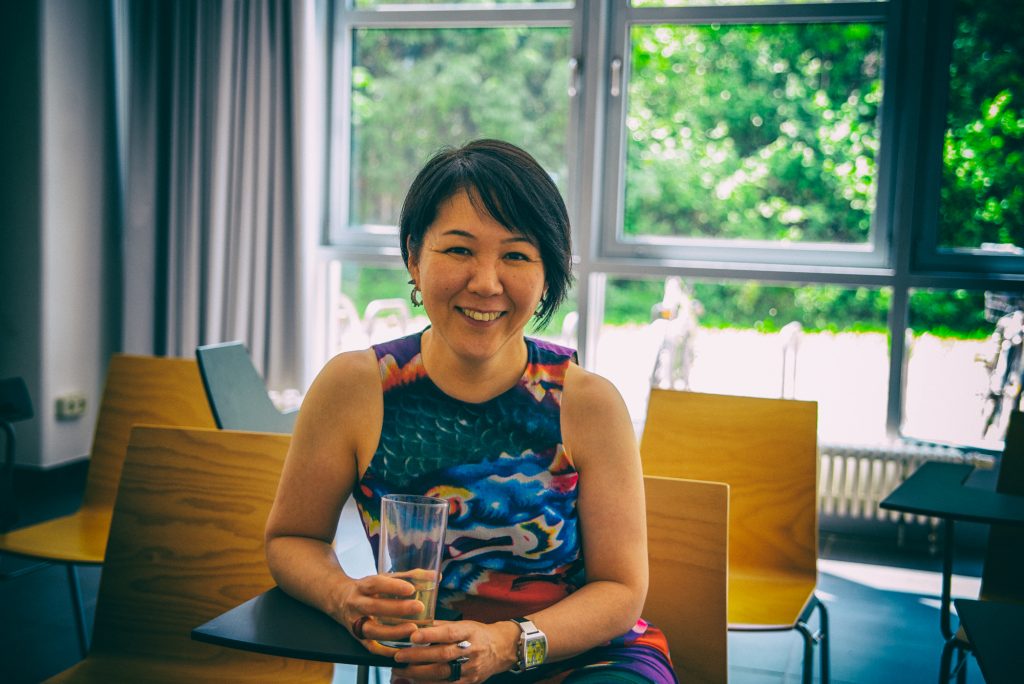
Nuremberg Calling
– Is it your first visit in Nuremberg or the TH Nürnberg?
No, it’s my second time in Nuremberg . I think it was 9 or 10 years ago.
– Did you hold a masterclass then?
No, I was visiting Germany. And a friend of mine was teaching at the Academy of Fine Arts (Akademie der Bildenden Künste Nürnberg). So she invited me to do a 2 day workshop. But it was something very short.
– Many people asked about the relationship to Sybille Schenker, our illustration Professor? You both graduated at the School of Visual Arts New York. Did you meet there for the first time?
Actually, we first met when I was visiting Nürnberg for the first time about 9 or 10 years ago. She was at school in New York but I was already out. So we were both invited to have a speech at the auditorium for students and we had a short meeting, but we did not really keep in touch. So now it’s almost like first time.
Working A Lot
– Another friend of yours, Illustrator Victo Ngai, once said in an interview for „Like Knows Like“ that she feels sort of isolated sometimes, having to cancel dates with friends because of the rush of the work and always trying to work faster. Was that a problem for you too in your career?
Not really (laughs). I mean … you know, there is one of the most famous illustrators from Germany, Christoph Niemann. You know him?
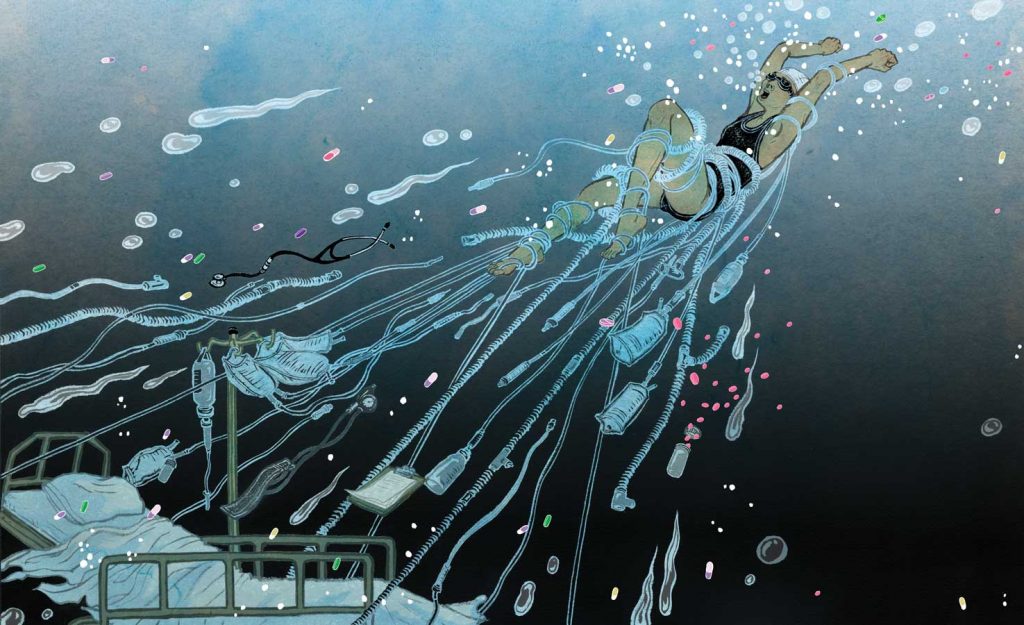
© Yuko Shimizu
– Yes, of course
Ok. So he’s super famous in the U.S. and everyone knows his work. The execution of his work is super simple, right? Normally it takes time to have all these great ideas. He is all about ideas. The worst idea is sterile, but I totally respect what he does and how he does it. It might take one hour and 30 minutes, to execute. I wish I was like that, but I’m not.
And than in Illustration – or if you work in any other creative field – you have to pick the style and medium that works for you. So I’m not the super pop up idea person. I mean, I have ideas but if it’s between ideas and look, my work is more about the look. And in order to get the look, I need to put hours into it.
So if it’s the same size for a magazine, Christoph and I get paid the same amount. I’m not messing with the time because it’s pretty mean to come up with ideas. Of course, it’s a lot. But the amount of physical time I have to put in to make my work look like my work … I mean, so that it is accetable for publishing, takes days and days and days.
It is like it is and I have to accepted that. And there is no way to make it shorter. In case of small images: Yes. Of course I talk to friends sometimes who need two hours for a full page illustration, which would take two to three days for me. Than I say: „I wish I was you. But I would be a really shitty you. So I just can’t.“
– So with „the look of your work“ you mean your individual style?
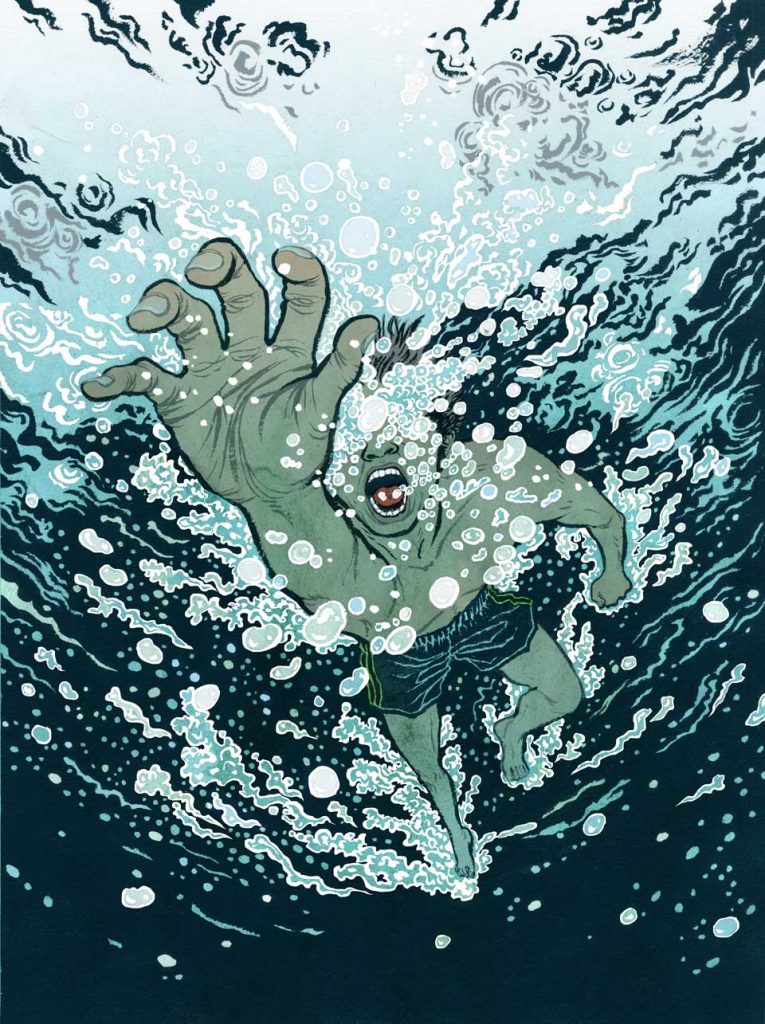
© Yuko Shimizu
Individualism And One’s Own Roots
– As an illustrator it is essential to be individualistic. Japanese society on the other hand has always been putting community before the individual. Do you feel that might have been a reason for you to leave your home country? Or – if it is okay to ask – was it something completely different?
Yes. I mean I could talk for hours about that topic because it’s very complicated. There are a lot of reasons. One point of course is, that Japan is not an individualistic country. It’s a farming culture. You have to get to the others to make the crops of rice which is a means of survival. The main food, right? So culturally or historically they were doing this for thousands of years and everything kind of circles around that. So you cannot stick out. You have to be part of the group. Being part of the group is way, way, way more important than the individual.
And how would that affect me as a Japanese person because I was born into that culture? So what makes me different was that I grew up in New York. I did middle school there and we were taught how to be individual. How to have your own ideas. And when I went back to Japan nobody was accepting me. And school was hard there. Then I went to college to study marketing. And I worked in corporate. Corporate is hard even in America where it is individualistic. But in Japan, just forget it. It’s even harder there. It’s a nightmare. So I was thinking of trying to get out of there for a long time.
Also – and that’s another reason – it’s very difficult to be a woman even in the most progressive countries like Germany or USA but it is even more crazy for women in Japan. So all this things combined, among other things, were just enough for me.
Social Media – Advantages and Disadvantages
– Did social media change anything about that situation? You use it a quite a lot as far as I know. And you got more than 300.000 followers on your facebook page.
Yes, I do have lots of followers on my artist profile but not on the whole scope of social media. And social media changes life for everyone and everywhere whether you have much followers or not. Or you use it or not. Especially for young artists who are starting out it’s much easier to promote themselves compared to when I started.
Of course we had websites but how do you promote your website for people to visit? And social media will help dramatically. We didn’t have that system. I started in 2003 where you had to promote your website one by one by one. And now with social media, in most cases, you will reach a lot more people at once. Especially people that don´t know about you will maybe follow you or even hire you because of what you post on social media. That’s the good thing.
But on the other hand you need to handle the flood of information. Students see lots of fantastic illustrations of strangers and think they have to copy the style because it’s popular. And we as instructors and professors have to say: „No, stay with what you do“. But we have to say that over and over and over again.
Another thing is that you can research about anything in social media and internet in general. I’m working on a kids book about Syria, so I need to do a lot of research. I did not write the book but I need to research for it. So I’ve never been to Syria but I find tons of information on the internet about the country.
So as adults we know how to handle the flood of information and can limit it because we knew life before the internet. We remember how it was before and it´s a not very long time ago. So we know how to navigate before social media navigates us.
– So it’s great that you can handle that new form of media …
Honestly, I spend too much time with it (laughs). Sometimes I’m waiting for the subway sometimes browsing. And then after I while I say: „Oops, what am I doing? Let me get a book to read.“
About Animals And Humans
– Talking about your social contacts: You have a Mexican chihuahua in New York. Does the dog still exist?
Yes. Actually one died some time ago and so I have another one now.
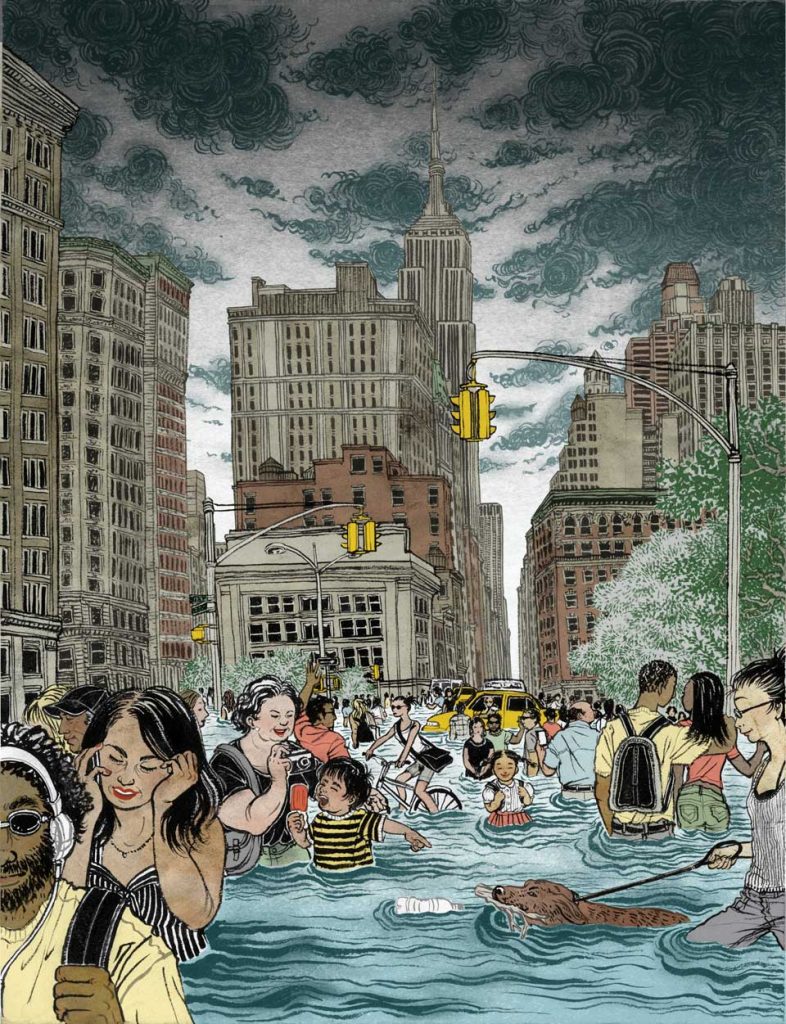
© Yuko Shimizu
– … and what role does he play in your day to day illustration process or dogs in general?
After the project got successful, many people from around the world were funding the project. So now they can rescue all kinds of animals, like farm animals, sheep, horses and also dogs. So I had to draw a spread of paper with dogs and that was very difficult because I usually do not draw lots of them. So the first dog I drew looked like a big rat (laughs) and than I erased it and started over.
So my dog does not play any role in my illustration career but he keeps company with me. He comes to work with me every day. He’s happy as long as I am there. And he sleeps all the time. So he keeps me company – because sometimes I have to work alone for days and days and days. So even though I communicate with people I don’t see my friends for some time.
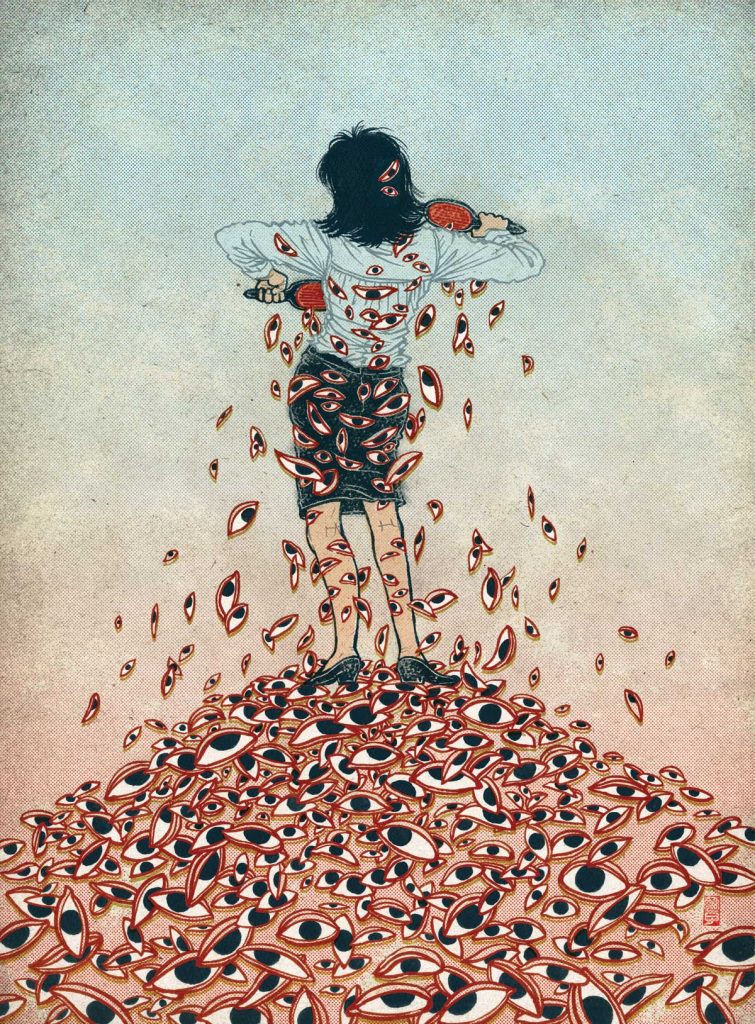
© Yuko Shimizu
„Hello Kitty“ Or The Usefulness Of Literature
– So you mentioned that you draw cats. You oftentimes get mixed up with another Yuko Shimizu who invented „Hello Kitty“. As you can read in many articles „Hello Kitty“ got her name from a story by Lewis Carroll, „Through the Looking Glass“.
– First of all I would like to to address: How often do you get asked about „Hello Kitty“? And what role does literature in particular play in your career as an illustrator?
Many people ask me about inspiration. And then I ask myself whether I should talk about it. A lot of things that define my person and reflect in my artwork are not relevant to me now but they are somehow part of me.
So actually at this point in my life anything new can be inspiration. When you get older you learn and experience a lot. And that’s one of the reasons why time runs so fast. So yesterday for example: I was walking to the subway station from here along the river. It felt like forever because I did not know where the end was – I had never experienced it. I thought like I was walking forever. And when I walked the second time, it felt not that long. So newness is something that stimulates us and we lose up as we experience it more.
– Great metaphor! And thanks to our park and the Nuremberg Underground …
Yes. So I came to Nuremberg and a student showed me some interesting walks on the map, many ways from the hotel to the TH Nürnberg and our workshop. And I followed the roads and saw interesting things … buildings, people and colours … like ice cream shops and so on. And it felt like a long time. But actually it wasn’t. And those new experiences are the most important.
That’s also exactly why I read in free time. And this refers to your question about literature: Reading of course is not visual and I work in the visual industry but reading is visual in your head. Whether it’s fictional or non fictional. It’s still vivid visual information and thats why people are so embarrassed when their favourite novel becomes a movie because it never reflects their fantastic imagination. And I feel that’s more and more important.
Time is limited. We only have 24 hours every day – and I need to sleep a lot. If I don’t sleep for 6 or 7 hours I’m a mess. And then I have to work, so that doesn´t leave a lot of time. Apart from following threads in social media – about what we talked earlier and what I try to keep as short as possible – I allways carry around books. I read about things that I don’t know much about. Sometimes reading books is also good because it gives us comfort. So since autumn I have read about 10 to 15 books about Syria – for the mentioned children’s book. Mostly non-fiction books. It started out as part of research but it was fascinating to learn about things that I’ve never heard of. Especially information about countries that I’ve never been.
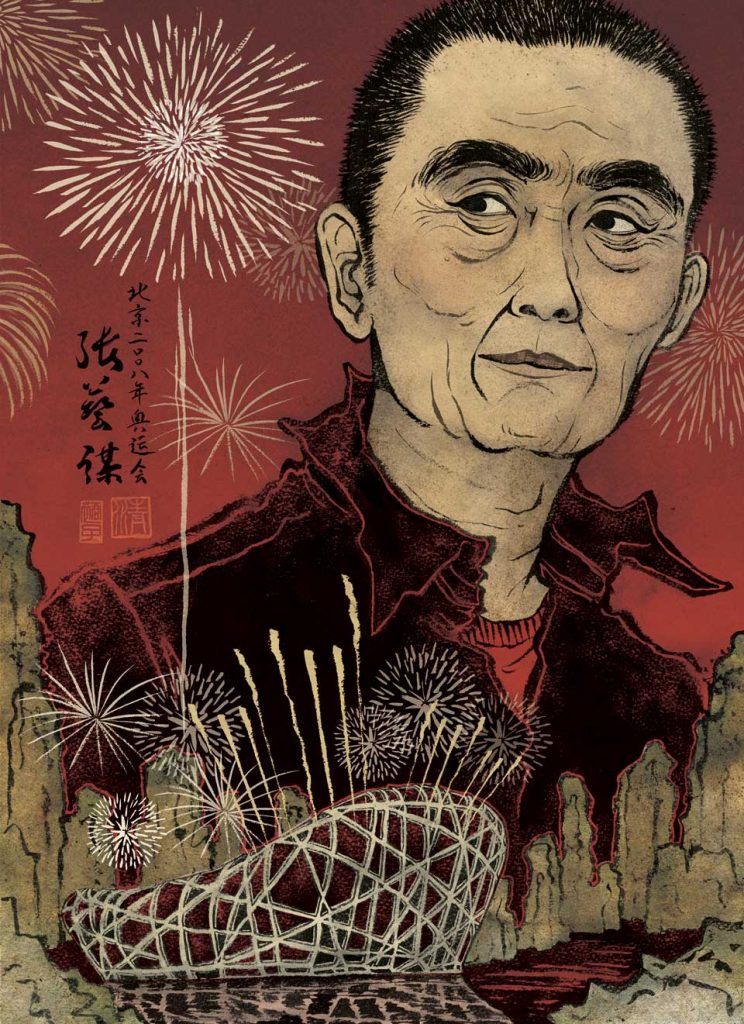
© Yuko Shimizu
Inspiration Everywhere – Holidays From Drawing And Independent Movies
– Apart from reading about foreign countries you also travel a lot. But as far as I know you don’t take pictures of a new country? Is that true.
– So you record the interesting impressions in your head and store it for future inspiration?
Yes, exactly.
– I read about your sources of inspiration: And another important one seems to be movies. Back in 2004 I visited a party from and with photographer and camera operator Christopher Doyle called „In the mood for Chris“. So in your Blog you mention him along with film director Wong Kar Wai as one of your all time favourite inspirations. They do lots of cooperations. So did you ever have contact? Or did you even work with them?
Christopher Doyle is great! I haven’t met them. But when they did the film „Ashes of Time (Redux)“, maybe about 5 to 7 years ago, they came to New York film festival. So we got the ticket and the they showed the film and did an interview. That was very interesting. I didn’t meet them but I saw them speak.
And then I have a graphic design friend from Korea who knows Wong Kar Wai and Christopher Doyle. So I said to him: „When we go to Hong Kong we have to meet them“ (laughs). Actually I’m not a movie person. I don’t watch a lot of movies. When I was in Japan we had a movie theatre which showed old movies. Two or thre at a time and you could stay as long as you wanted. At that time I watched more movies – more independent and not so much hollywood movies. I mean, films like „Back to the Future“ were great but I feel, there are not too many films oft that kind. So my inspiration came especially from independent movies or Avantgarde. Right now movies are not really my inspiration.
– What was your last movie that you watched?
It was a french movie. I think it was called: „ Girls of the sun“ („Les Filles du soleil“, 2018). It’s with a famous Iranian actress who lives in France. It’s about female fighters in Kurdistan. It was very interesting. Not the best produced movie but a film that Hollywood would never make. But it was really hard to find a movie theatre that showed the movie. And it was shown only one day. And so me and my friends came to together and said: „We have to see it tonight, because today is the only night“.
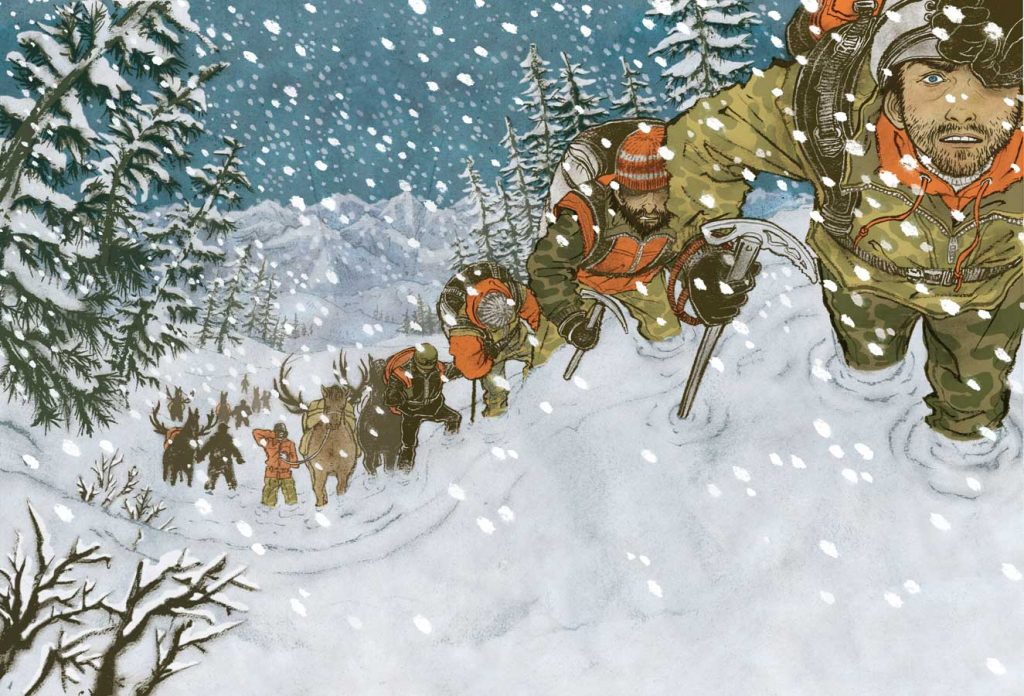
© Yuko Shimizu
Are You A Political Activist Then?
– Kurdistan … Syria … the role of women in Japan and the rest of the world … Cultural differences and similarities. So you seem interested in socially and politically difficult topics and seem to engage in them a lot. So what is your motivation? Is it a sort of social commitment? Do you like to help others?
So I don’t have the desire to become a kids book illustrator although that’s a dream for a lot of illustrators. For example, if I get asked to do an illustration about lemonade for kids and I have to take my savings for that, I say no. But if it is a social commitment, I’d probably do it. If you put so much time into a projekt, it has to mean something for someone. It doesn’t have to be a bestseller but it’s important to have the book out there for kids to learn about the facts and not to judge other people who are different.
One of the first books I did was about Japanese intern camps, these were basically concentration camps where Japanese and Americans were put into. They were not killed, it was like a prison in the middle of nowhere in the desert. So this was a project not many illustrators can do because you need to understand American and Japanese culture. There was just one other illustrator who would have been able to do it and she refused. At the end I was the one who could do it, otherwise the book would not have been done. Therefore, there was a sort of duty there. – And then came the book about pets rescue in Syria.
I’m mainly interested in dictatorships in civil wars and post World War II. I don’t exactly know why. Maybe because my parents where the last generation to remember war. From time to time they talk about it. So I am the first of what they call in Japan „non post war“ person. What Germany did well was to reflect upon World War II. A lot of countries didn´t do that. Americans don’t do it either. Japanese are not doing it enough. The textbooks in school don’t talk about Japanese intern camps or civil war crimes so these illustration books fill the gap. They believe in a better future hopefully.
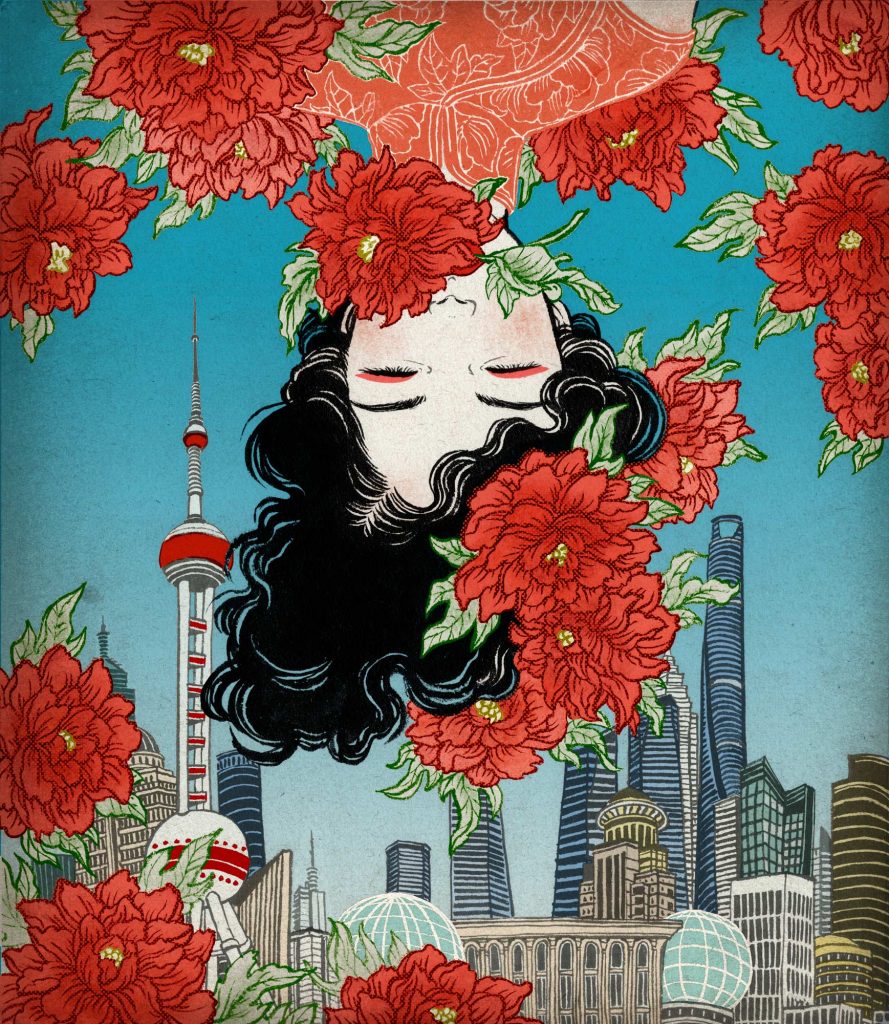
© Yuko Shimizu
– Are you a political activist then?
Illustration As Design – Design As Illustration
– To come back to illustration: You said that you get the call when there is a project about Japan. How does that reflect on your illustrations? You use the color red a lot is it a reference to the Japanese flag or asian symbols?
Well, sometimes yes. It’s not that I make Japanese themes to work. There are not many Japanese illustrators in the US in comparison to Korean or Chinese illustrators. And with Japanese themed work they oftentime come to me because I don’t need to do research from scratch. I know how things work. So it’s easy to hire me for that.
And yes, that’s why I use the reds and orangy-reds, which is the Japanese red. I use it to indicate that it is Japanese. On the other hand I also simply like the color and therefore I use it a lot but for different reasons.
In the end I like to be known as a Japanese illustrator working in the US. Because, you know, I have to pay my bills. For some projects I have to take my savings, but also the savings have to come from somewhere. It doesn’t mean that I take every job that is about Japan and I don’t work for everyone.
If something is against my political opinion to a certain point, I will refuse it. I would be ashamed to work for big oil companies for example. The question is: „Do I want to be known as someone who workes for big oil companies? I don´t think so!“ I would not work for McDonalds either.
– I’ve heard that you worked with another great designer: Stefan Sagmeister. Was it difficult?
I worked three times for him. Yes! He pushes you. That’s what he is good for. Every time that I worked for him I came to the point where I thought: „Oh my god. I will die.“ (laughs) He is a very nice person of course. He says: „It’s good … but … I think it’s not good enough. Think about why I want to work with you. Because of this … and this … and I think it’s not there yet.“ And then after thinking about it. I say to myself: „Yes, he’s right!“
– How did you get in touch with him?
I think he contacted me the first time out of the blue. He was doing some charity work. He was hired by a New York based charity organisation to redecorate the libraries in elementary schools. Especially schools which were located in socially difficult areas with not much fundings. He saw a magazine cover I did. He said it would be perfect. And then we worked together.
– And your project?
Stefan usually does the code and divides the space around into panels. So we have illustrations of kids for example with the type that is illustrated. We worked on that together. That was not easy.
The first idea was too obvious for him. He wanted something more „magical“ not so literal. So I reworked it and presented. Then he somehow liked it but the type did not work. So then he put tracing paper on top and asked to rewrite it because it’s hard to read in his opinion (laughs).
It was a process. It was challenging but that’s good. I’m glad I did it and it was nice to go to the opening. I mean nobody knew us but it was great to see how happy the kids, parents and teachers were about the new library. That’s absolutely ok.
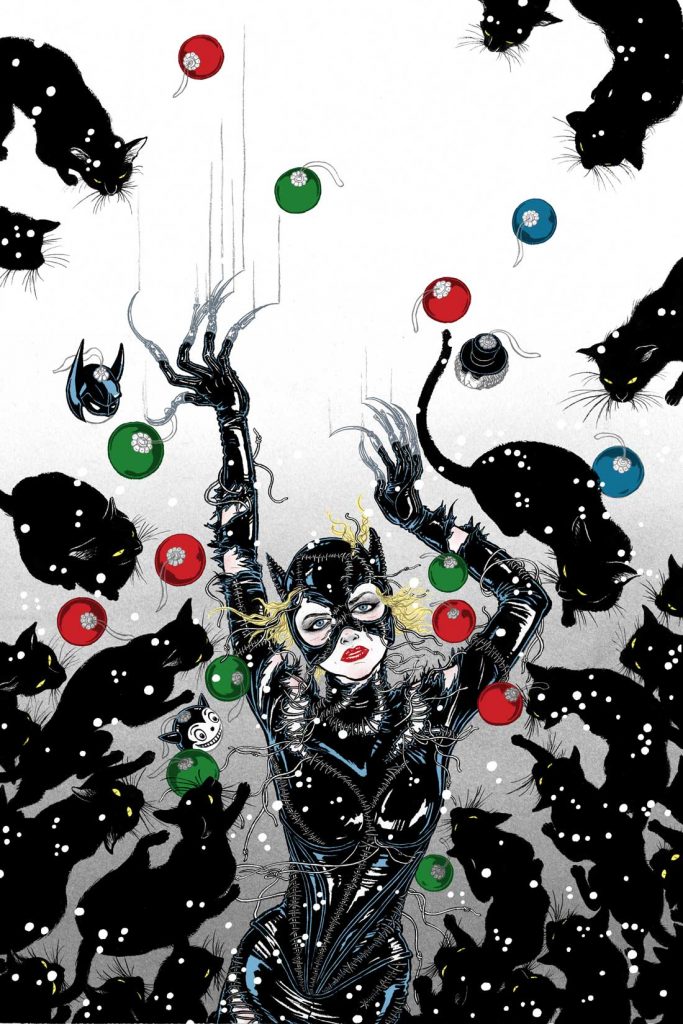
© Yuko Shimizu
For Inspiration – As Almost Always?
– So one last question? As you like independent movies … have you ever visited Germany’s „Nippon Connection“? It’s the most important festival for independent Japanese movies outside Japan. It ended just a few days ago. Or the „Japan Day“ in Düsseldorf?
I don’t know about it. But a friend of mine just told me that she was there at the Japan Day. There were lots of people and big firework (laughs). Maybe visit these festivals one day.
– For inspiration – as almost always?
Yes. Exactly.
YUKO SHIMIZU (清水裕子) …
… is a Japanese illustrator based in New York City and instructor at School of Visual Arts. Newsweek Japan has chosen Yuko as one of “100 Japanese People The World Respects. She has won several awards and worked for huge range of customers like Nike, Microsoft and DC Comics. Just to name a few. Illustration is actually Yuko’s second career. Although art has always been her passion, she had initially chosen a more practical path of studying advertising and marketing at Waseda University and took a job in corporate PR in Tokyo. It never quite made her happy. Illustration is where she found her own voice which she raises in many interesting projects. Maybe she cannot change the world but she helps to make it a little better.
Selected Clients
Apple, Philadelphia Museum of Art, NIKE, Library of Congress, Adobe, Paramount Pictures, Visa, PepsiCo, Warner Brothers, Wacom, DC Comics, Simon $ Schuster, TIME, The New York Times, Newsweek, The Gap, Microsoft, Pentegram, MTV, Target, GQ, Rolling Stone, The New Yorker, Sagmeister @ Walsh, Fuse TV, NPR, Warner Elektra, Atlantic Music, T-Mobile, Neiman Marcus
Awards
Hamilton King Award 2018, California Yound Reader Medal 2018, Musuem of Tolerance Yound Reader Award 2014, Newsweek Japan (100 Japanese People World Respects 2009), Society of Illustrators Original Art Founder’s Award 2013, Magazine of the Year Award, etc.
More info via … www.yukoart.com
Interview and Foto: Giuseppe Troiano, Ton: Tung Ming, Illustrationen: Yuko Shimizu
